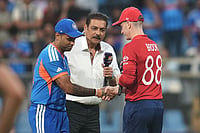It was yesterday, certainly yesterday. They dragged him down to the local railway tracks and laid him there, nailing him to iron with all the leftover stones they could gather. He didn’t stir; rather he stirred within the confines of his stillness. He could have opened his eyes if he wanted to, and hours later when he felt the weight of sands upon him, he did. Sands and pebbles flooded his eyes and through the crevices he found night stars burning down at him, and tall lamps, parallel and perpetually bent. The summer heat reminded him of the stoicism and indifference of winter and the divine whiteness of snows elsewhere. For his country was the land of the suns. To think of something else he thought of the cold nape of his neck over the metal. Suddenly he had the urge to be naked, to lie there in suspended impassivity, and wait for the winds to blow over him. That would enliven him, he believed. He felt the need to smile. In that supreme effort he could hear the rupture of his muscles, one collapsing over the other.
Hunger and the desire to defecate followed one another. He sensed the movements of insects and rodents over his frail body, for his sensations were active still. Forcing the upper lip to depart from the lower, he managed an insignificant gap in the mouth, enough for the insects to fade from sight. Slowly, in that false route of escape, the creatures vanished, one parodying the other. In that precise moment he remembered his mother who taught him the ways of sucking and chewing. Now he was reduced to gulping and swallowing. Nevertheless, it quenched his appetite. After this, the process of shitting. And he shat, without an attempt, lasting not more than three seconds. A considerable excitement over his anus. Might be the insects, a conjecture. Must be the insects! He felt like writing a novel about exits in their perfect whole, suffering insubstantial alteration along the journey. Everything ceased for a moment. An exceeding pain seared through his groin down to his ankle. In the absence of other similar sounds he heard his own groans and squeals. The rats, on this rare occasion of unearthing a disproportionate mate, squealed back in mercy and departed from the unfinished meat.
All he could recollect was a hammer blow over his head during his ritualistic night walk. He wanted to know all who tried to murder him. Even kill them and eat their flesh. If not know them, just to see them once, to remember them, every detail down to the colour of their skin and dirt in their nails. Thinking, he imagined, interpreting the situation he is in, incapacitated him. As if contemplation required muscles too. Venturing for hours, he accumulated all that he had done since childhood, all the times he had heard the word “No” and listened instead to his own eccentricities, the times he refused to march and wear the uniform, how he vandalized the Principal’s theory of conformism, hawking on political banners from his terrace, the girl whom he thought he loved and left, the man to whom he sold his stale book of poems, his graffiti on roads for birds to see and rebel against the skies. Have they all come to hunt him down, as he had always anticipated? Was it just one among them whom he had rebuked?
“I can’t reach my pocket for apologies, and I’ve none left. That I’ve nothing to offer, itself speaks of my humble novelty,” he used his mind’s mouth. He thought with this physical agony, on the wake of a lonely summer dawn, he would eventually fade away like that death which strikes but doesn’t end all. He wanted to think about all he had been, as his last thoughts. How he resembled a gap between words, a pause in breaths taken and given up, a dialogue in the interstices of an aside, a space where things could unfold themselves, without dying in others, undefined words within unformed structures, worm-like being writing itself, circling the world with a branch and a rope, recourse to endless movements, not knowing what he wanted to be, whether he wanted to be, if he knew the way to be, or to stop the ways to be. All the days of prior actions clustered his mind, rising, falling, hanging and sailing, changing, clipping, hopping, planting, gnawing, sowing, rowing, mowing, howling, whining, hiding, piping, kneeling, peeling, spitting, hitting, farting, darting, hissing, pissing, yawning, pawning, and willing and not moving.
Someday it would be morning again. He was always scared of staring into twilight. This transition of uncertainty unsettled him to the core of his supposed sanity. In this moment of delirium, he remembered that the economic dispute of 1925 closed the local railways indefinitely. The trains do not come here. He thought of his murderers. Perhaps, this was a sort of punishment, not finishing off entirely, but this unhindered wait for death. Surviving on insects out of life’s instinct and then the periodic, repeated recurrence of the habit of waiting. “A vengeance well planned out,” he murmured in that silence. He wanted that air trumpet, the friction of steel raging toward him, the wailing of distant siren, the changing of lights one last time. He imagined the wheels over him, cutting him in halves, without toil, despair or shame, negating the presence of his body altogether. And how he always comprehended his being in the world, alone and in the crowd with the beings of others and his selves living in so many compartments. Now is not the time or it is.
Out of that indelible silence he heard a distinct motion from afar and hooters like drumbeats. “The train has finally arrived,” he spoke for the first time tonight. Waves of freedom and happiness surged over him and not knowing anymore that he could not move, he turned his head toward the siren. Now, with one half of his head flat against the lines, sands dripped out of his eyes, he could hardly see anything. He presumed he saw an army marching toward him, all holding hands and beating their breasts in rage. Then he concluded it was a train, for he couldn’t reckon without suspicion humans walking with such clarity over single rail lines. In that confusion, the warmth of the summer air dawned back upon him, the body regained its sickness. He slowly turned his head back again to its native line, and felt the cold, resigned air entering through his nape.



















